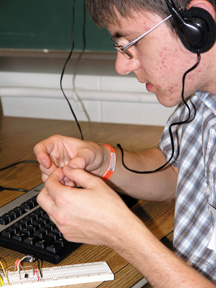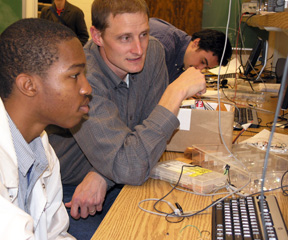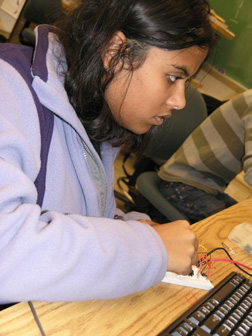ECE 101 Engages Students by "Harnessing" Their Interests

ECE 101 student working on electronic trip wire.
 Gen Ed Physical Sciences requirement: "Check."
Gen Ed Physical Sciences requirement: "Check."
 Gen Ed Quantitative Reasoning II requirement: "Check."
Gen Ed Quantitative Reasoning II requirement: "Check."
November 4, 2011
Illinois’ General Education requirements are often viewed by students and teachers alike as exactly that—requirements to be gotten out of the way and checked off the list. To view these classes as opportunities to learn and grow is the perspective of the minority, and a few in this minority are doing something about it. At least two teachers in the Department of Electrical and Computer Engineering are trying to change the way students and educators view these basic requirements and are offering a class that pushes students to go beyond the minimum.
The mechanism for change these faculty members are using is an introductory course, ECE 101: Exploring Digital Information Technology. The project began a decade ago when Professors Michael C. Loui and Douglas L. Jones both recognized the need for a general education course that would serve students in all disciplines. They designed a class, now taught by Lecturer Christopher Schmitz, that teaches engineering concepts to non-engineering students and gives them opportunities to create technologies. ECE 101 fulfills the Gen Ed requirements for both Physical Sciences and Quantitative Reasoning II, but according to Loui, the real goal of the class is to “get students more intellectually engaged in the course beyond simply taking it to fulfill a General Education requirement.”

Christopher Schmitz works with ECE 101 student during class lab.
The class itself consists of three sections. First, the students learn about the Web and Web creation, learn some HTML, and build an e-commerce site that could be used for purchasing and downloading music. The second part of the course focuses on digital media, including images and sound. Students do experiments with sound and complete a project that involves classifying digital images by color. Finally, students learn about how computers work and design and build a musical synthesizer. Class projects are designed so that participants connect the concepts they learn to areas of interest or situations in their own lives and focus more on students’ needs rather than on common class project standards. When they begin to study a new topic, Schmitz first asks students about their experiences with similar technologies and concepts. “[Schmitz’s] idea was to use the diversity of students’ interests and bring that back into the classroom,” says Loui. “Students would bring the applications to their experiences and lives and back into the classroom, and use that as better motivation to get them more engaged.” Schmitz and his colleagues call this “diversity harnessing,” which refers to diversity in the educational background of students, including their abilities and background knowledge of engineering. They are currently working on a project, funded by a National Science Foundation grant, to advance the class. “I would like for students who take the course…to actually see and find utility in what they learned, well beyond the end of the semester. That’s really what we’re trying to do with this [class] and this grant,” says Schmitz.”

ECE 101 student works on project during class lab.
In keeping with this idea, the final project for ECE 101 is more open-ended than those of many similar classes. “In the second year that I was teaching it, I decided that this thing needed a project. Students needed to be able to take something that they were interested in and try and expand upon it,” Schmitz says. He goes on to describe how he encourages them to think outside the box when choosing their final project. He asks, "'What do you want to build, if you could build anything? Shoot for the moon!' Then my job and the TA's job is to scale that back. 'Well, you may not be able to do that, exactly, but you could do this.'" In ECE 101, students link their class work with other interests in their education or extracurricular activities by choosing a topic that is relevant and interesting to them. “We do find that when students have a clear goal, and they are strongly motivated to that goal, that they will learn what they need to learn. This is the principal of project-based or problem-based learning, and students learn a great deal from that kind of exercise,” said Loui. Schmitz agrees. “My philosophy is that students shouldn’t just be learning about engineering; they should actually understand it well enough to know when there’s an engineering solution to something that they need,” he says.
According to Loui, general education engineering courses like this one are rare, and little research has been done on the long-term impact of this type of course. Loui, the evaluator of the course, will speak with current and past students to determine why they chose to take the course and how they have applied what they learned in ECE 101 to other educational or extracurricular endeavors. The evaluation will also compare what students learned in ECE 101 with other Gen Ed courses they have taken. Schmitz is continuing to make improvements to the class and the way it is taught: “The course lives and breathes, and it changes every semester, because we see something that maybe we could do better,” he says. Although they are in the early phases of evaluation, Loui is impressed by what the students have accomplished. Despite being non-engineering majors, the students of ECE 101 have created some impressive projects, including two "Just-For-Fun"-category prize-winning projects at Illinois' Engineering Open House. This comes as no surprise to Loui. “We shouldn’t underestimate our students. If we give them a reasonable challenge and support them sufficiently, they can achieve amazing things,” he says..
For more information, please see the ECE 101 course website, the NSF-funded project (Enhancing the ECE101 Curriculum Through Diversity Harnessing) website, or NSF's TUES (Transforming Undergraduate Education in Science, Technology, Engineering, and Mathematics) and CCLI (Course, Curriculum, and Laboratory Improvement) program websites.
More: ECE, Funded Projects, Undergrad Education Reform, 2011













.jpg)
















